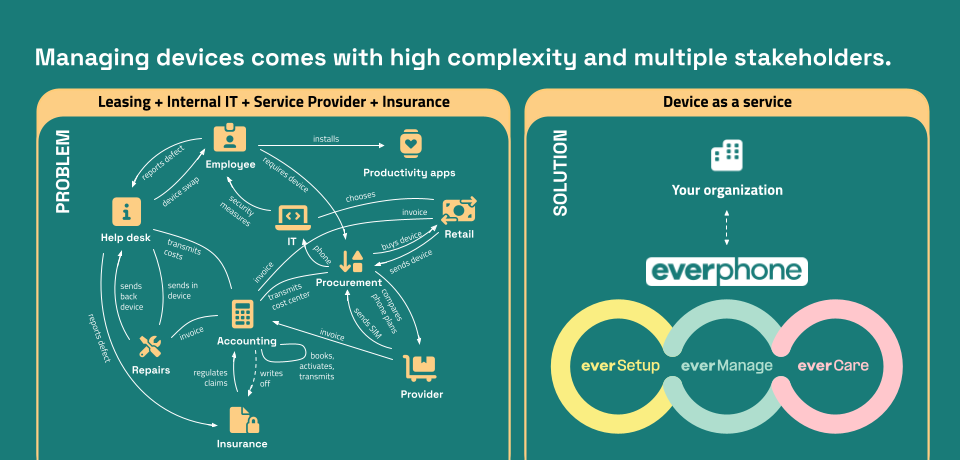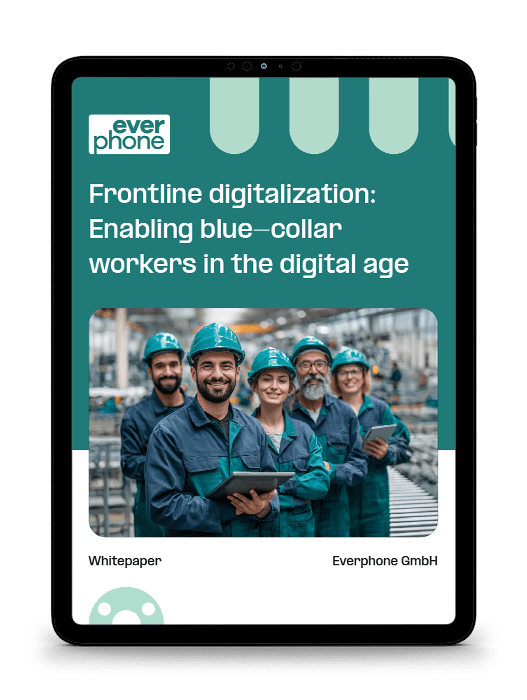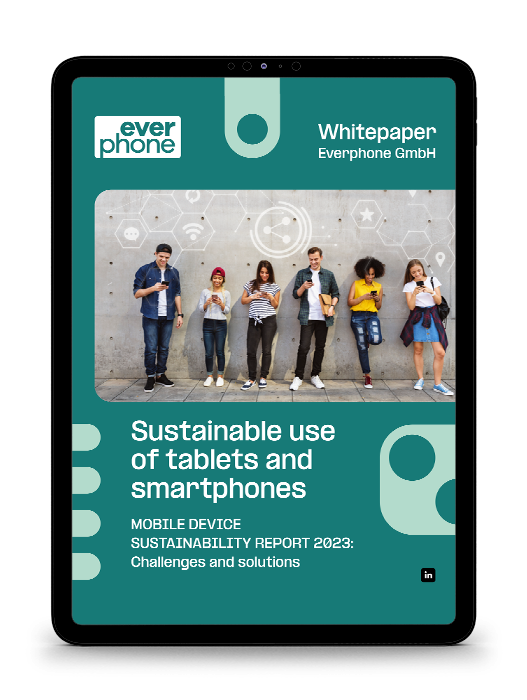With “Device as a Service”, Everphone offers the so-called third generation of IT procurement. In the following article, we explain why this vision is so convincing. Everphone editor Robert Nagel spoke with Marc Anger, SVP Sales SME & Large Enterprise at Everphone.
From leasing to “Device as a Service”
Robert Nagel: Hello, Marc. In sales, “Device as a Service” is regarded as an alternative to IT leasing. What exactly is the difference, and how is a DaaS player like Everphone perceived?
Marc Anger: The corporate environment of large IT leasing providers is of course fundamentally different from the dynamics of a start-up. At Everphone, we focus one hundred percent on one value chain and map it completely. From our point of view, this is a great vision. The right path for IT procurement of the future.
Focus on complete value chain
Robert: What exactly do you mean by that?
Marc: Some IT leasing providers also act as solution providers–but fundamentally they are IT financial service providers with additive additional services around the IT lifecycle. However, leasing always involves a fulfillment partner, usually several.
The classic leasing relationship is a triangular relationship consisting of customer, financier, and supplier. Everphone, on the other hand, covers everything in the area of smartphones and tablets from a single source – a huge advantage.

Robert: So it’s not just a difference in payment method, it’s a whole different strategy?
Marc: A value integrator with strategic and operational added value can take the place of a supplier and a service provider that offers a purely financial service. And in this stringency, combined with a rental model, only Everphone offers that at the moment from my point of view. So there is both a motive and an opportunity, so to speak. For me, this is a massive reason to believe in Everphone’s vision.
“Mobile work is the work of the future”
Robert: At Everphone, we focus primarily on smartphones and tablets. Where do you see the role of mobile devices in the future?
Marc: It will become even more dominant. If you look at where the most significant degree of innovation is currently, it’s clearly in mobile devices, perhaps still together with cloud technology. I would just mention the current mobile communications standard 5G, a real quantum leap, and foldable devices with foldable OLED displays.
Robert: Especially recently, the Corona-related upheavals in the world of work have demonstrated the importance of mobile technologies. This would not have been possible without mobile devices. Is mobile working how the future will look?
Marc: I see the future above all in merging the private and professional worlds in terms of devices. I only know a few people who want a strict separation of devices: “I’ll put my work cell phone away and won’t be reachable anymore.” The question is: How can this be managed smartly in the future? Everphone wants to address precisely this challenge. The user should take care of his tasks and not the devices. The same applies to companies’ internal IT.
Risks in the value chain
Robert: When working with startups, corporations are often very skeptical about the value proposition. Does that bother you in terms of key account business?
Marc: Absolutely not, because our value creation is completely in-house and the leasing triangle outlined does not exist. So the customer always has only one and not several contractual partners. So it’s actually the other way around.
Robert: Could you elaborate on that?
Marc: Of course, buyers want to minimize risks in the value chain, that’s logical. But they often neglect the fact that when they work with a leasing company, the only value it adds is in the form of financial services.
In concrete terms, the lessor does not handle the mobile devices, but the customer orders the required assets from the supplier. When the order is confirmed, the lessor takes action and pays the supplier for the device. However, if the leased device is defective, the customer must contact the supplier. However, the supplier has already received the money and is naturally not interested in additional costs. Alternatively, the customer can negotiate with any insurance company involved. This can quickly become complicated.

“It is extremely important for buyers to understand this”
Robert: Why does it get complicated?
Marc: Even if the customer has an exclusive contractual relationship with the leasing company, they still have to use subcontractors for the fulfillment. Although the leasing company can control their service promise and portfolio, if there are process difficulties here, the leasing company can only provide limited support because it is outside their own value chain.
Robert: By definition, this leads to high overhead and loss of time.
Marc: And especially with mobile devices, which are very close to the core business processes, it is becoming increasingly important simply to have a functioning device pool and not to shift IT tickets and cases from pillar to post. That’s why intelligent out-tasking makes so much sense: Because it completely takes over the operational side. It is extremely important for buyers to understand this. Many are not aware of this.
Intelligent outtasking
Robert: Otherwise the IT specialists in the company would have to take care of everything.
Marc: Exactly, or the help desk. Highly specialized IT professionals are currently in short supply and are actually much more urgently needed for other tasks. Outtasking helps enormously here because the handling, the actual operational tasks, are completely outsourced. The company can then return to its core business and not need to hire or train in-house Mobile Device Managers to manage and troubleshoot the mobile fleet.
#Unleasing
Robert: This is the kind of relief Jan always means when he talks about “unleasing”.
Marc: We understand the term “unleasing” to mean much more than that. The device-as-a-service approach is not only based on collaboration, which allows you to focus on your core business, but also on creating as much transparency as possible. Through intelligent controlling, we enable companies to learn more about the user behavior of their users. What broke when and where, how long the usage cycles are and the cost structures of the individual user groups. The homogenization of device pools and also the digitization of non-desk workers can be further goals of companies. This has a lot of potential and affects many areas, from controlling to HR to office management.
In that sense, IT outtasking is actually more of a quick-win and a good entry point for our Everphone pitch. Everphone, however, has made it its mission to manage everything related to the smartphone – and to do so as a core business
Leasing providers have a different focus, as do the manufacturers’ captives such as AFS (Apple Financial Services, editor’s note). Naturally, they only want to finance their own devices. It’s understandable that Apple doesn’t want to finance Samsung hardware. In principle, however, you have to see the captives for what they are: an instrument for boosting sales within your own group. The customer then also has to make compromises.
Robert: For example?
Marc: Often, there are restrictions on countries or regions. There are also often limitations on certain device classes or models; older smartphone models are often not included in the financing construct. And the fundamental restriction to one manufacturer is of course a major drawback compared to a choose-your-own-device approach.
Robert: Do companies waste potential here?
Marc: Yes, they do. After all, there are two aspects to this. One is productivity and the digitization of the workforce. Employees are more productive and more satisfied when they can work with a device they know how to use. In this respect, they should also have a choice. The second aspect is employee satisfaction. In the battle for young talent, it’s a good boost to employer appeal from a business perspective if employees can choose a cool smartphone.
Robert: I assume the employees do like that option?
Marc: It is perceived as an acknowledgment if the employee gets high-quality devices. So it’s only logical to cater to the wishes and needs of the ultimate user and let him choose the device himself. On the other hand, simply “handing over” a device is actually detrimental to employee satisfaction. Even if it is a high-quality smartphone.
Robert: Marc, thank you for your comments.
























